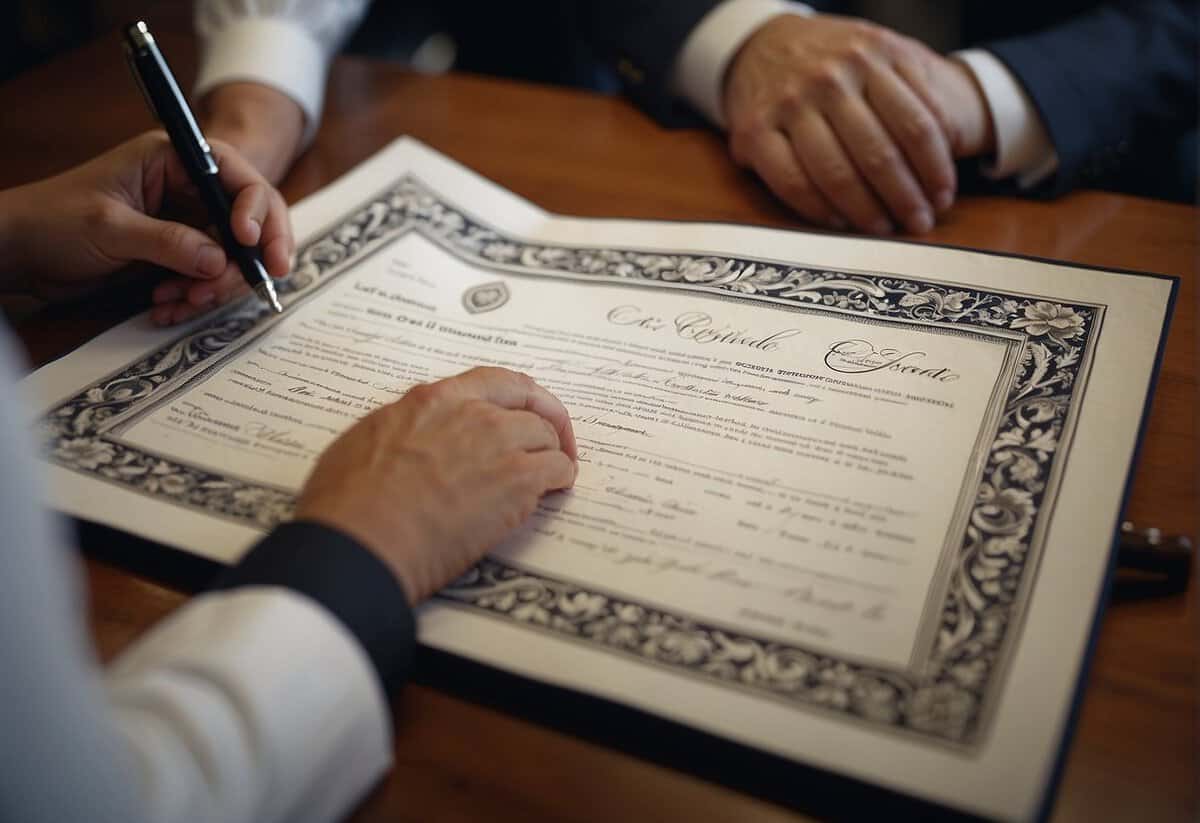Can You Get Married with Just 2 Witnesses: A Simple Guide to Intimate Ceremonies
If you’re planning to tie the knot, you might wonder if you can get married with just two witnesses present. The straightforward answer is yes, in many places, you can have a legal marriage ceremony with only a couple of witnesses. The requirements regarding witnesses for a wedding ceremony vary by location, reflecting a wide range of legal frameworks across different states and countries.

In some areas, witnesses are a legal necessity to ensure that the marriage has occurred openly and with reliable testimony. Typically, these witnesses must be adults and they sign the marriage certificate to attest to the validity of the ceremony. The role of witnesses is not only a formality but also serves as a safeguard within the legal system to record that the marriage was conducted properly and willingly between the parties involved. For a more specific answer tailored to where you reside, it’s recommended to check your local marriage laws or consult with a legal expert.
Key Takeaways
- You can legally marry with just two witnesses in many places.
- Witness requirements vary by location and are often legally required.
- Witnesses attest to the validity and proper conduct of the marriage ceremony.
Legal Requirements for Marriage

Before you say “I do,” you’ll need to meet specific legal requisites. This involves obtaining a marriage license, providing proper identification, and satisfying your state’s legal regulations. Here’s what you need to know to ensure your big day goes off without a hitch.
Acquiring a Marriage License
To marry, you must first apply for a marriage license from a local government authority, typically the county clerk’s office. This legal document is a must-have and may require both you and your partner’s social security numbers, depending on the state. For example, in Oklahoma, the application for a marriage license must also be signed by two witnesses.
Age and Identification Checks
You and your partner must prove you’re legally old enough to marry. This typically means being at least 18 years of age. For verification, a birth certificate, driver’s license, or passport are commonly accepted forms of ID. If under 18, you may need a court order or parental consent. For instance, in several states, such as Illinois, those between the ages of 16-18 require parental consent.
Waiting Periods and Residency Requirement
After applying for a marriage license, some states impose a waiting period before it becomes valid. The waiting period can range from 24 hours to a few days. Additionally, most states don’t require you to be a resident, but there are exceptions, so checking your specific state laws is critical. Remember, these parameters vary by location, so always consult your county’s regulations to avoid any surprises on your marriage journey.
The Roles and Responsibilities of Witnesses

When you’re planning your wedding, selecting your witnesses is as personal as it is procedural. The witnesses you choose will have the honor of signing their names alongside yours on a legally binding document and play a critical role in your ceremony.
Choosing Your Witnesses
Who to Consider: Typically, your witnesses are people who are significant to you and your partner. They can be close friends, family members, or even the best man and maid of honor. Choosing someone you trust and who is present at your life’s pivotal moments can add a meaningful touch to your ceremony.
Legal Requirements: Ensure your chosen witnesses meet any legal age requirements, which is usually 18 years or older. Whether you need one witness or two can vary by state or country, so it’s essential to understand the local laws to ensure your marriage is legally recognized.
Witness Duties During the Ceremony
Signing the License: The primary duty of a witness is to observe and confirm the marriage by signing the license. Your witnesses will be asked to sign their names, making sure that the signatures of the couple and the officiant are correctly recorded.
Responsibility: After the exchange of vows, witnesses typically complete their signature immediately. Their signature serves as a testament that the marriage occurred and that both parties agreed to it willingly.
Remember, your witnesses aren’t just bystanders—they’re a foundational part of your wedding, serving as legal verifiers and honorary participants on your big day. Choose individuals who bring joy and support to this significant milestone in your life.
Conducting the Marriage Ceremony

When planning to get married, the central event to bring your union to life is the marriage ceremony. It’s where the couple publicly expresses their commitment, and the presence of witnesses often makes the occasion legally valid.
Selecting the Officiant
Choosing the right officiant is crucial as they’ll oversee the formalities of your union and ensure that your wedding ceremony meets legal standards. Depending on your state, you might need an ordained minister, a justice of the peace, or a judge. Some states, like Pennsylvania, even allow you to have a self-uniting marriage without an officiant, but this would still require two witnesses and an official signature to certify the marriage.
Picking a Location
Your location sets the stage for your nuptials and can be as unique as your relationship. Whether you prefer a traditional church, a serene beach, or a local courthouse, make sure it accommodates your needs and complies with any legal requirements for marriage ceremonies. Some states mandate that the ceremony occur in a public place, while others have more lenient regulations.
Ceremony Essentials
The essential elements of a marriage ceremony typically involve the exchange of vows, the giving of rings (for those who choose to), and the proclamation of marriage by the officiant. In most cases, the law requires the couple and the officiant to sign a marriage license, with some states, like Oklahoma, also requiring the signatures of two witnesses. Ensure the required elements, such as a marriage license application, are in place to avoid any surprises. Make your ceremony complete by personalizing these elements to reflect your bond and celebrate your wedding ceremony just as you envisioned.
Post-Wedding Formalities

After saying “I do,” with two witnesses, a few essential steps remain to ensure your union is legally recognized and all personal documentation reflects your married status. Let’s guide you through the process.
Filing for a Marriage Certificate
Once you’re officially married, your first step is to obtain a marriage certificate. This legal record proves your marriage and is often signed by your witnesses. Visit your local county clerk’s office to file for the certificate; expect to pay a fee for a certified copy. You’ll need this document for many of the upcoming changes to your personal records.
- Where to file: Your local county clerk’s office
- What you need: Valid ID, possibly witnesses’ information
- Fee: Yes, for a certified copy
Changing Your Name and Updating Documents
If you’re opting to change your name, begin by updating your social security number with the Social Security Administration. This change is vital, as it affects your status with the IRS and other government entities.
- Social Security Administration: Notify them first; it impacts taxes with the IRS.
- Driver’s License/State ID: Visit your local DMV; bring your updated Social Security card and marriage certificate.
- Passport: Don’t forget to update your passport with your new name and marital status.
Make a checklist of all other places requiring an update:
- Bank accounts
- Creditors
- Employer records
- Health insurance
Consider setting up a joint bank account with your spouse, if desired. The certified copy of your marriage certificate will usually be required for name change processes and updating records, so keep it handy.
Frequently Asked Questions

When planning your marriage ceremony, understanding the legal requirements for witnesses is crucial to ensure your special day goes smoothly. Here’s a breakdown of what you need to know about witness requirements for weddings.
What are the witness requirements for a courthouse wedding?
Courthouse weddings typically require at least one witness, but this can vary by state. For instance, some states may require two witnesses to sign your marriage license.
How many witnesses are needed for a marriage ceremony in Florida?
For a marriage ceremony in Florida, you need two witnesses who are over the age of 18 to sign the marriage license.
In which US states can you get married without any witnesses present?
There are a few states where you can get married without any witnesses. For example, Ohio does not require witnesses to sign the marriage license.
Is a single witness sufficient for a legally binding marriage?
In some states, like New York, having just one witness who is 18 years or older is sufficient for your marriage to be legally binding.
What are the general wedding witness requirements across the states?
General wedding witness requirements vary, but most states require at least one or two witnesses to sign the marriage certificate. These witnesses are typically over the age of 18 and provide confirmation that the marriage ceremony took place.
Can couples have a legally recognized marriage ceremony with just themselves and two witnesses?
Yes, couples can have a legally recognized marriage ceremony with just themselves and two witnesses. The key is to comply with the specific laws of the state where the marriage is taking place.

